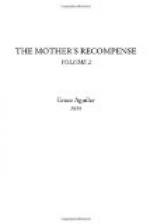Emmeline threw her arms round her mother’s neck. In vain she struggled to ask who was the young man of whom her mother spoke. Why should she inquire, when she felt that he never, never could be anything to her? Bitterly, painfully she struggled to dismiss the thought hastily from her mind, and gladly hailed the entrance of the nurse with her little nephew as a relief. Her mother joined her in caressing and playing with him, and ere he was dismissed the scattered parties had returned, and there was no opportunity for farther confidential converse.
It was a happy, merry party at Oakwood, but the presence of Lilla Grahame was wanting to make it complete. Ellen was constantly with her, for she would not permit the lively proceedings of home to interfere with the call of friendship; and in this task of kindness she was constantly joined by Edward, who would frequently leave gayer amusements to offer Lilla his company on her walk, and his intelligent conversation, his many amusing anecdotes, frequently drew a smile from his young listener, and, combined with Ellen’s presence and more quiet sympathy, raised her spirits, and encouraged her in her painful task of bearing with, if she could not soothe, her father’s still irritable temperament. Moorlands was to be sold; for Mr. Grahame had resolved on burying himself and his child in some retired cottage, where his very existence might be forgotten. In vain Mr. and Mrs. Hamilton combated this resolution, and entreated him at least to settle near them; gloomy, almost morose, he still spoke of Wales as the only place where he was not known, where his name might not be associated with disgrace. Lilla was just of an age to feel the parting with the kind friends of her childhood as a most painful trial, but she determined to reconcile herself to her father’s will whatever it might be.
Captain Cameron too was an agreeable addition to the society of Oakwood; high-spirited, and naturally joyous, Percy liked him as a kindred spirit; and reserved, though intelligent, Herbert found many points of his character assimilate with his. Mrs. Cameron’s station in life had been somewhat raised since her return to England. Sir Hector Cameron, her husband’s elder brother, childless and widowed, found his morose and somewhat miserly disposition softened, and his wish to know his brother’s family became too powerful to be resisted. He had seen Walter in Ireland, and admired the young man ere he knew who he was; a farther acquaintance, ere he discovered himself as his uncle, heightened these good impressions, and Walter, to his utter astonishment, found himself suddenly the heir to a rich baronetcy, and his mother and sisters comfortably provided for. He rejoiced at his good fortune, but not at the baronetcy itself; not for the many pleasures which, as Sir Hector’s heir, now stood temptingly before him, but because he might now indeed encourage an affection, which he had once believed was as hopeless as it was intense.




